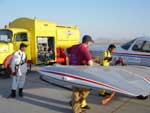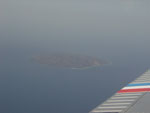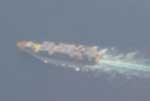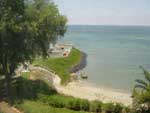

75
DAYS TO GO
![]()
DONATE
| HOME |
| DIARY |
| ROUTE |
| SPONSORS |
| PRESS ROOM |
| BREMEN FLIGHT |
| CHARITY |
| THE AIRCRAFT |
| THE PILOTS |
| CONTACT US |
© Copyright World Flight 2002
|
May 10th - Luxor, Egypt
to Djibouti An early start to the day, we arrived at the airport at 5am. After going through numerous security checks we arrived at the departure door with the aircraft in site. Then we got the bill for handling which shocked us both, $600 and this was after negotiating and refusing to pay the full amount. After settling up with the Handling Agent we got ready for start up. We turned the key in the ignition - nothing happened, the battery was dead. We had to call up the Handling Agent again and organize a car to come out to us as luckily we had jump start leads with us so we should be able to start the aircraft with external power (though we had not tried this before so we were not sure it would work). For another $60 a fire truck came over to the aircraft and we connected the jump leads to its battery and the other end into our auxiliary power socket. With the Fire Truck revving its engine Paul turned the key in the ignition and the engine sprang to life, thank god for that. I fought my way through the slip stream of the propeller and jumped in - we were off. We discussed going on a flat battery and concluded with a 10 hour flight ahead the battery should charge on route. This was only the start of the long 10 hour flight. We climbed to Flight Level 90 (9,000) feet as the mountains below reached 8,000 feet in spots, our rate of climb was low as with all the fuel onboard we were heavy. When we were flying over these barren rugged mountains I wished for the water to come into view sooner rather than later as there was no safe place to put the aircraft down if the engine failed. In the cruise another problem appeared, we had planned for a ground speed of 120 Knots but we encountered a 25-30 knot headwind and our ground speed dropped to 90 knots - at this speed we worked out we did not have enough fuel to make Djibouti. We kept on track for Djibouti as per our flight plan hoping the headwind would reduce or we would have to divert into Yemen (this may have proved complicated on the ground as we did not have a landing clearance to land in Yemen or Visas). Approaching the border of Egypt and Saudi Arabia over the Red Sea we were told not to enter Saudi Arabia but to fly to Djibouti over international waters - this puzzled us for a while as this was not per our flight plan. We replanned our trip to fly down the middle of the Red Sea in between the airspace of Saudi and Egypt. This was a more direct track which suited us as it saved fuel but we would be over water for 8 hours. Directly below us we could see ships traveling like us on the international waters routing up the Red Sea. We also saw a spectacular site of a large military convoy of ships and an aircraft carrier moving north up the Red Sea, when you are flying over water with no site of land, seeing anything brakes the long journey. 10 hours later we approached Djibouti with the sun low in the sky. The view into Djibouti was spectacular with mountains in the back ground and desert reaching down to a sandy coastline. Below the city of Djibouti was a collection of low laying settlements and a large port. The strategic signifence of Djibouti could be seen as it commands the entrance to the Red Sea. We made a VOR Procedural approach (an approach using navigational instruments) to runway 09 (a 10,000 foot runway). Landing on 09 we were surprised to see all sorts of military aircraft and helicopters parked around the airfield. Djibouti, a former French Colony has French, Italian, German and American troops based there due to the strategic signifence of the position of the country. The country's economy survives from the earnings of port and the foreign troops stationed in Djibouti. Also all food aid and fuel for Ethiopia arrives into Djibouti and is then transported by truck to Ethiopia, Djibouti earns revenue of these shipments. For all it's strategic importance it is a poor country with 80% unemployment and very run down streets and buildings. We headed of that night to our Sheraton Hotel to meet Airport Director, David Hawker who gave us free landing and parking at the airport and assistance in maintaining our aircraft while in Djibouti. After a couple of beers we had to eat as we had not eaten since leaving Luxor. Actually, for the flights to date we either have forgotten to bring food or just not felt like eating while flying. Though we will be stocking up in some cereal bars, we found these the simplest and quickest to eat in the cramp cockpit - with our life jackets on there is little room to move and even at 11,000 feet the temperature is showing 26 degrees around this part of the world. Tomorrow we fly Oman.
|
|
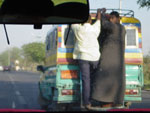
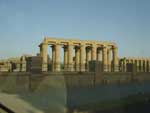
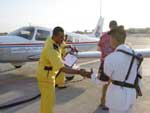 Luxor - Refueling
Luxor - Refueling
